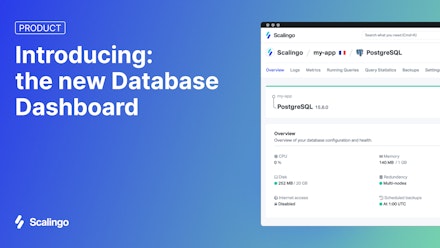OpenSearch® plugins : key plugins and their use cases

At Scalingo, we have chosen to add OpenSearch® to our managed databases offering. Supporting this open source alternative to Elasticsearch® will allow us to make regular updates, with fewer licensing constraints and thus, offer a more modern product, suitable for current usages : semantic search, AI, analysis…
To meet these needs, our OpenSearch® plan includes several essential plugins by default. Let’s talk about these plugins and their use.
OpenSearch® plugins for advanced search and indexing
The first use case we think about when we talk about OpenSearch®, is advanced search and indexing of documents. OpenSearch® allows for the indexing of large volumes of data, structured or not, to enable advanced researches, in full-text and with filters. It’s a common use case for e-commerce applications, documentation and knowledge databases for SaaS applications.
If you opt to use Scalingo for OpenSearch®, several useful plugins are included by default in our offering, to provide ways to build a smart search engine and use it efficiently :
- opensearch-sql : Enables SQL-like queries for exploring and analyzing indexed data, simplifying complex search logic for developers and analysts.
- opensearch-knn : Supports high-speed vector similarity search, ideal for semantic and personalized search experiences in large product or content catalogs.
- opensearch-ml : Integrates machine learning capabilities to preprocess data, generate embeddings, or enhance search scoring with custom models.
- opensearch-ltr : Adds Learning to Rank support, allowing tuning of result relevance based on user behavior and click feedback.
- opensearch-neural-search : Provides semantic search using neural network models and vector embeddings for more intuitive, context-aware search results.
- opensearch-index-management : Automates index lifecycle operations like rollover and retention, ensuring search infrastructure stays fast and efficient at scale.
- opensearch-geospatial : Searches fields that contain points and shapes on a map or coordinate plane.
OpenSearch® plugins for logs analysis and monitoring
Another common use case for OpenSearch® is log centralisation, analysis and monitoring. With its powerful search engine, OpenSearch® Dashboards (ready to deploy on Scalingo) and some plugins, you can use this service to improve the observability of your infrastructure or also diagnose or optimise your applications.
Here are the plugins included in our Scalingo offering to enable logs analysis and monitoring :
- opensearch-index-management : Automates log index lifecycle operations such as rollover, retention, and deletion—ensuring storage efficiency and long-term log manageability at scale.
- opensearch-anomaly-detection : Continuously analyzes streaming log data to detect unexpected spikes, drops, or patterns using unsupervised machine learning, helping teams quickly spot operational issues or security threats.
- opensearch-alerting : Enables rule-based alerting on log events or metrics, allowing teams to get notified in real time when critical conditions are met (e.g., error rates, system failures).
- opensearch-observability : Provides dedicated views and correlation features across logs, metrics, and traces, simplifying root cause analysis and improving visibility across distributed systems.
- opensearch-notifications : Manages delivery of alerts and messages through channels like Slack, email, or webhooks—ensuring the right teams receive timely alerts based on their log data.
- opensearch-asynchronous-search : Allows long-running log queries (e.g., across large time ranges or multiple indices) to be processed asynchronously, freeing up client resources and improving reliability in heavy-use environments.
- opensearch-reports-scheduler : Allows OpenSearch Dashboards to create PNG, PDF, and CSV reports.
OpenSearch® plugins for alerting and anomaly detection
As already highlighted by the previous use case, OpenSearch® can be used for alerting purposes and precise anomaly detection. You can configure OpenSearch® to make it continuously analyse your data, in order to detect abnormal variations in your logs, metrics or key indicators and configure actions to be performed or alerts to be sent when the criteria specified in your rules are fulfilled. In case of critical events happening on your apps, you will be automatically alerted, allowing you to quickly take action on the root cause of the problem.
The Scalingo for OpenSearch® offering includes several plugins to answer these needs :
- opensearch-alerting : Triggers real-time alerts based on thresholds, conditions or anomalies.
- opensearch-anomaly-detection : Detects unusual patterns across logs or metrics using ML.
- opensearch-notifications : Core infrastructure powering the notifications system.
- opensearch-observability : Core plugin powering all observability-related plugins.
- opensearch-reports-scheduler : Allows OpenSearch Dashboards to create PNG, PDF, and CSV reports.
- opensearch-ml : Support for machine learning.
OpenSearch® plugins for AI and RAG
With its vector search capabilities, allowing for data comparison using semantic proximity, OpenSearch® is a suitable database for advanced use cases in generative AI and RAG. Perfect for designing enhanced assistants, intelligent conversational interfaces or tools for contextual search, Scalingo for OpenSearch® enables AI integration in your apps, while ensuring security, sovereignty and control of your data, with several plugins that can be used for this purpose :
- opensearch-knn : Creates vector indexes, necessary to use AI and RAG in applications.
- opensearch-ml : Integrates machine learning capabilities, for example to preprocess data or enhance search scoring with custom models.
- opensearch-flow-framework : Aims at streamlining the OpenSearch® app development (including AI apps) experience through a drag-and-drop designer.
As we just described, OpenSearch® is a versatile service : search, AI, alerting, it can be used in numerous use cases, depending of the needs of your organisation and of your applications. It adds improvements for your users, with a more intuitive semantic search for example, but also internally, with systems capable of quickly detecting anomalies. There are many plugins for OpenSearch®, but those highlighted above are already available in Scalingo for OpenSearch®, our new fully managed database service for OpenSearch®, allowing you to use the service in a secured and sovereign environnement, without having to worry about infrastructure management. Select an OpenSearch® plan on our dedicated page, and start using OpenSearch® in just a few minutes !



